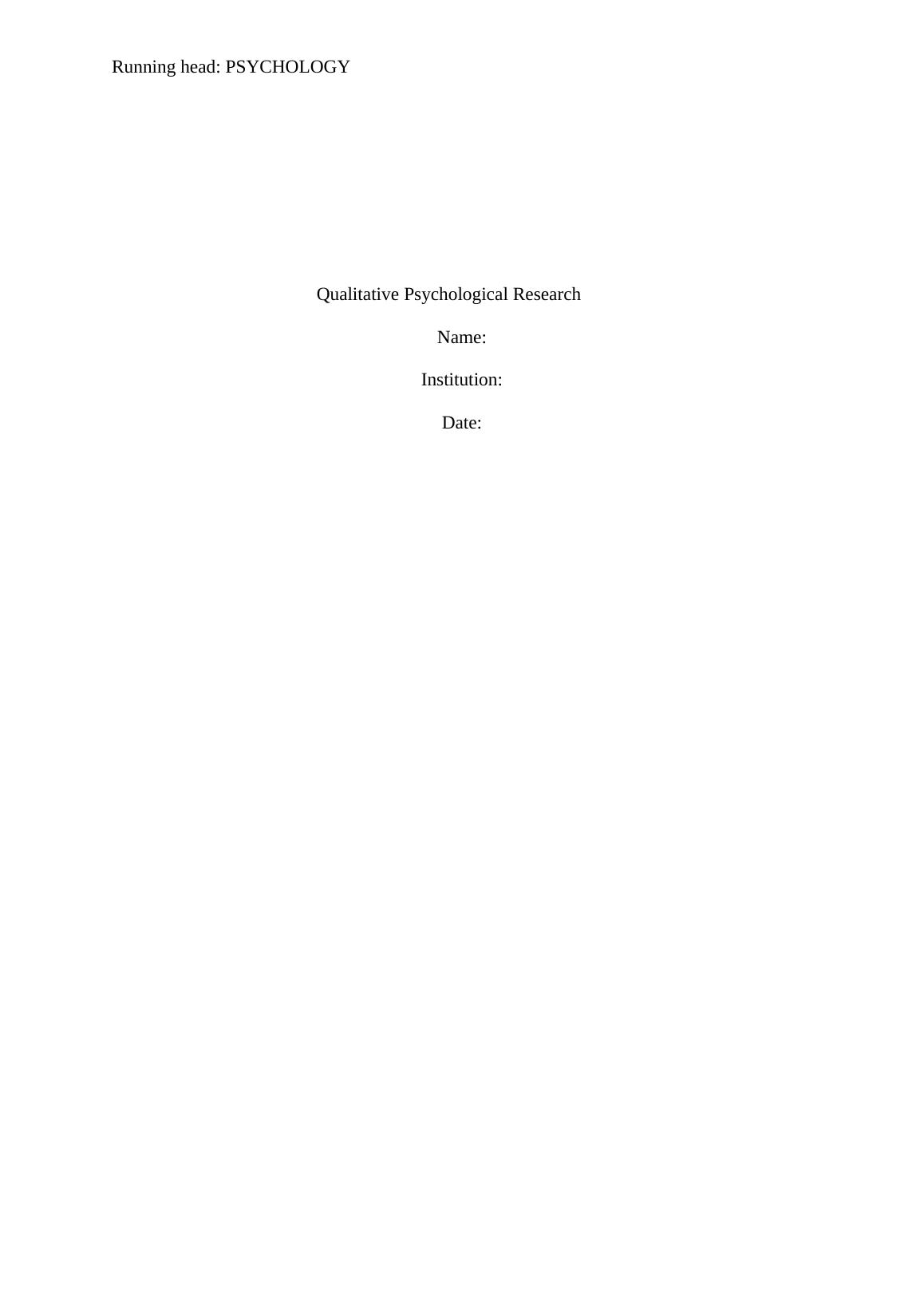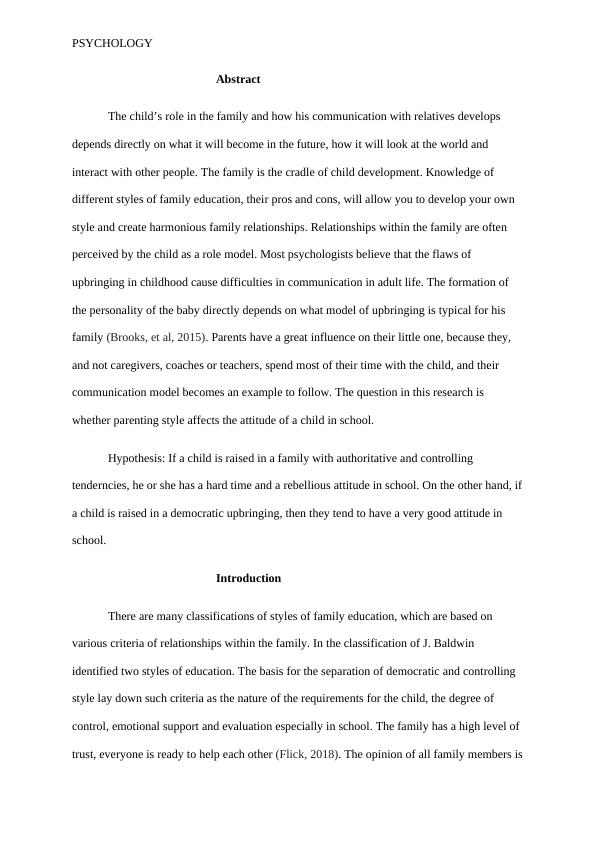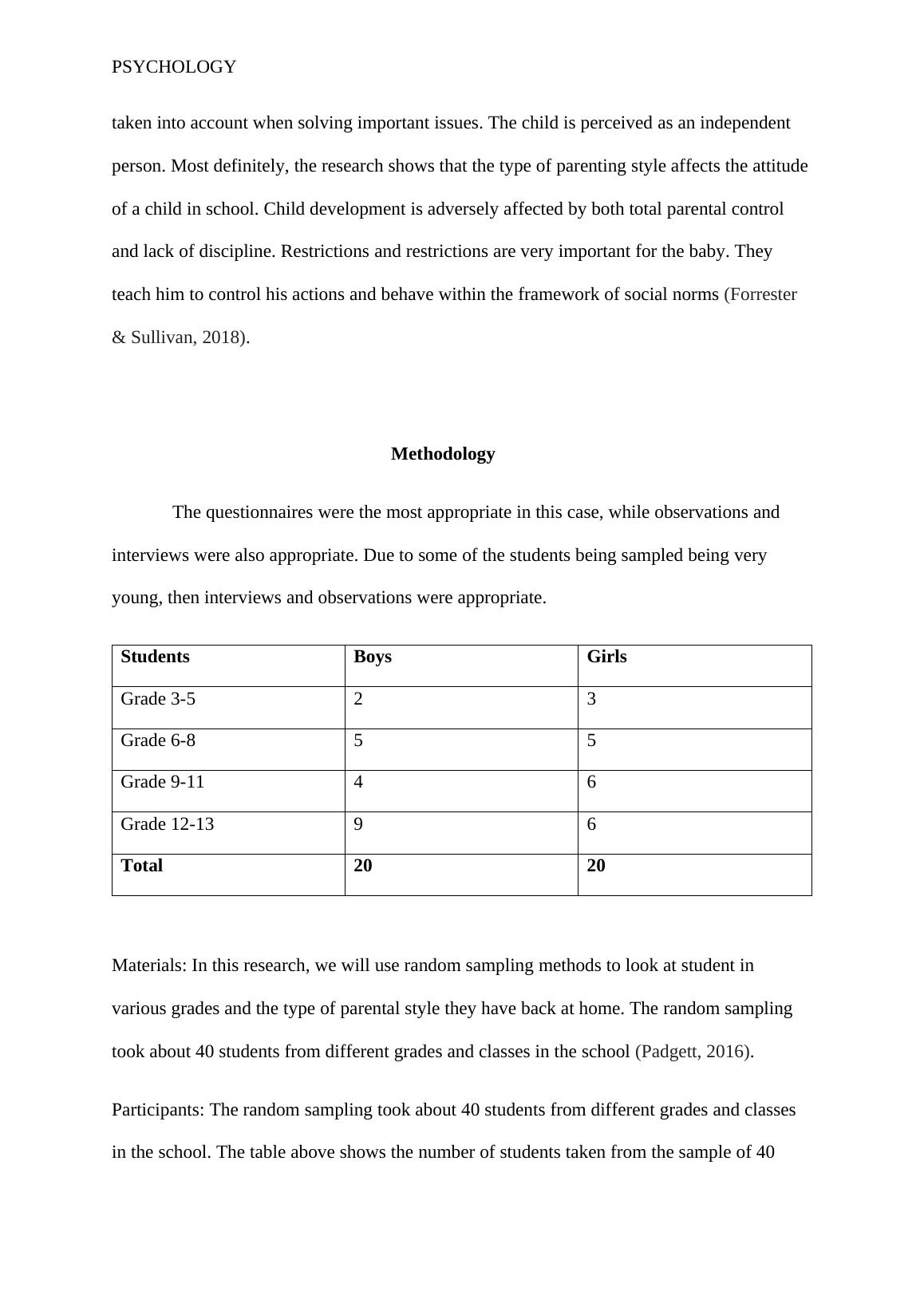The Impact of Parenting Style on a Child's Attitude in School
Added on 2023-04-20
10 Pages1617 Words480 Views
Running head: PSYCHOLOGY
Qualitative Psychological Research
Name:
Institution:
Date:
Qualitative Psychological Research
Name:
Institution:
Date:

PSYCHOLOGY
Abstract
The child’s role in the family and how his communication with relatives develops
depends directly on what it will become in the future, how it will look at the world and
interact with other people. The family is the cradle of child development. Knowledge of
different styles of family education, their pros and cons, will allow you to develop your own
style and create harmonious family relationships. Relationships within the family are often
perceived by the child as a role model. Most psychologists believe that the flaws of
upbringing in childhood cause difficulties in communication in adult life. The formation of
the personality of the baby directly depends on what model of upbringing is typical for his
family (Brooks, et al, 2015). Parents have a great influence on their little one, because they,
and not caregivers, coaches or teachers, spend most of their time with the child, and their
communication model becomes an example to follow. The question in this research is
whether parenting style affects the attitude of a child in school.
Hypothesis: If a child is raised in a family with authoritative and controlling
tenderncies, he or she has a hard time and a rebellious attitude in school. On the other hand, if
a child is raised in a democratic upbringing, then they tend to have a very good attitude in
school.
Introduction
There are many classifications of styles of family education, which are based on
various criteria of relationships within the family. In the classification of J. Baldwin
identified two styles of education. The basis for the separation of democratic and controlling
style lay down such criteria as the nature of the requirements for the child, the degree of
control, emotional support and evaluation especially in school. The family has a high level of
trust, everyone is ready to help each other (Flick, 2018). The opinion of all family members is
Abstract
The child’s role in the family and how his communication with relatives develops
depends directly on what it will become in the future, how it will look at the world and
interact with other people. The family is the cradle of child development. Knowledge of
different styles of family education, their pros and cons, will allow you to develop your own
style and create harmonious family relationships. Relationships within the family are often
perceived by the child as a role model. Most psychologists believe that the flaws of
upbringing in childhood cause difficulties in communication in adult life. The formation of
the personality of the baby directly depends on what model of upbringing is typical for his
family (Brooks, et al, 2015). Parents have a great influence on their little one, because they,
and not caregivers, coaches or teachers, spend most of their time with the child, and their
communication model becomes an example to follow. The question in this research is
whether parenting style affects the attitude of a child in school.
Hypothesis: If a child is raised in a family with authoritative and controlling
tenderncies, he or she has a hard time and a rebellious attitude in school. On the other hand, if
a child is raised in a democratic upbringing, then they tend to have a very good attitude in
school.
Introduction
There are many classifications of styles of family education, which are based on
various criteria of relationships within the family. In the classification of J. Baldwin
identified two styles of education. The basis for the separation of democratic and controlling
style lay down such criteria as the nature of the requirements for the child, the degree of
control, emotional support and evaluation especially in school. The family has a high level of
trust, everyone is ready to help each other (Flick, 2018). The opinion of all family members is

PSYCHOLOGY
taken into account when solving important issues. The child is perceived as an independent
person. Most definitely, the research shows that the type of parenting style affects the attitude
of a child in school. Child development is adversely affected by both total parental control
and lack of discipline. Restrictions and restrictions are very important for the baby. They
teach him to control his actions and behave within the framework of social norms (Forrester
& Sullivan, 2018).
Methodology
The questionnaires were the most appropriate in this case, while observations and
interviews were also appropriate. Due to some of the students being sampled being very
young, then interviews and observations were appropriate.
Students Boys Girls
Grade 3-5 2 3
Grade 6-8 5 5
Grade 9-11 4 6
Grade 12-13 9 6
Total 20 20
Materials: In this research, we will use random sampling methods to look at student in
various grades and the type of parental style they have back at home. The random sampling
took about 40 students from different grades and classes in the school (Padgett, 2016).
Participants: The random sampling took about 40 students from different grades and classes
in the school. The table above shows the number of students taken from the sample of 40
taken into account when solving important issues. The child is perceived as an independent
person. Most definitely, the research shows that the type of parenting style affects the attitude
of a child in school. Child development is adversely affected by both total parental control
and lack of discipline. Restrictions and restrictions are very important for the baby. They
teach him to control his actions and behave within the framework of social norms (Forrester
& Sullivan, 2018).
Methodology
The questionnaires were the most appropriate in this case, while observations and
interviews were also appropriate. Due to some of the students being sampled being very
young, then interviews and observations were appropriate.
Students Boys Girls
Grade 3-5 2 3
Grade 6-8 5 5
Grade 9-11 4 6
Grade 12-13 9 6
Total 20 20
Materials: In this research, we will use random sampling methods to look at student in
various grades and the type of parental style they have back at home. The random sampling
took about 40 students from different grades and classes in the school (Padgett, 2016).
Participants: The random sampling took about 40 students from different grades and classes
in the school. The table above shows the number of students taken from the sample of 40

End of preview
Want to access all the pages? Upload your documents or become a member.
Related Documents
Parenting Styles in Singapore and Their Impact on Childrenlg...
|35
|6187
|46
Challenges Parents Face in Restricting Child Television Time and Childhood Obesity: A Quantitative Studylg...
|6
|1330
|345
